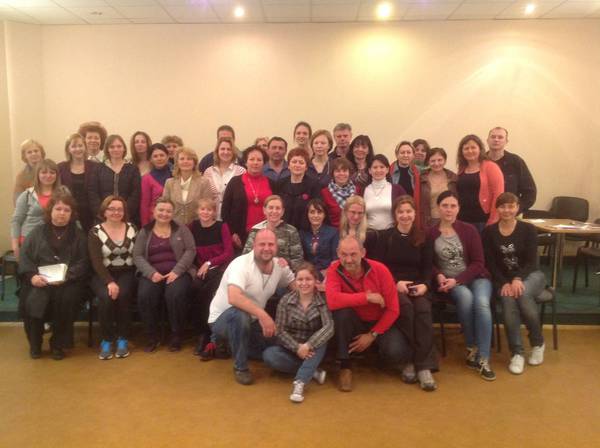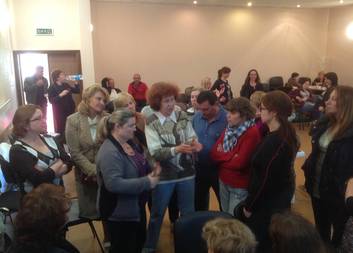Caritas Czech Republic, in cooperation with Caritas of the Archdiocese of Olomouc and the Slovak Catholic Charity, organised training for Ukrainian psychologists on issues related to crisis situations. The training was part of the humanitarian aid and relief provided by the aforementioned organisations following the unrests in Maidan in February 2014. The unrest caused a number of deaths and injured hundreds of people.
Specialists from the Slovak non-profit organisation Blue Angel have dealt with diminishing the impact of crisis situations during the first and the successive phase for a long time. During the first half of May, the specialists trained 38 psychologists in Kiev and 33 in Lvov. All of the participants praised the tutors’ extraordinary professionalism and emphasised the importance of the chosen topics. The topics were especially important given that so many people in Ukraine are currently experiencing psycho-trauma and that the conflicts in Eastern areas still persist.
“Currently, the financial needs of the victims of unrest are being met either by non-profit organisations or by the Ukrainian government. The government has approved financial support for the people wounded in Maidan and for families who have experienced loss. Therefore, we consider investment in psychosocial skills of Ukrainian psychologists as currently the most effective form of aid,” said Vladislav Vik who is responsible for Caritas Czech Republic’s projects in Ukraine.
 The seminars were a great benefit with all of the participants becoming members of the newly established Association of Specialists for Overcoming the Consequences of Psycho-Traumatic Events. In doing so they will now be able to provide further help throughout the whole of Ukraine.
The seminars were a great benefit with all of the participants becoming members of the newly established Association of Specialists for Overcoming the Consequences of Psycho-Traumatic Events. In doing so they will now be able to provide further help throughout the whole of Ukraine.
“The aid from Caritas Czech Republic and Caritas of the Archdiocese of Olomouc influenced not only the training of the specialists but also the development of a better structured psycho-traumatic aid system,” Dženyslava Čajkivska writes in her letter of thanks to Caritas Ukraine.
See below quotes from the letters of participants from the training sessions:
Elena Aminyeva from Poltava: “I had chance to apply my knowledge and skills of crisis intervention in practice. I liked working in threes. I had the opportunity to test my knowledge of working with children. (…) After a practical training session we were able to share our experience, ask additional questions and gain further support. (…) The film was interesting for me because I was able to watch and distinguish various emotional states of the main hero. Thank you for the opportunity to acquire these important skills which will enable me to help my colleagues, victims of trauma and families suffering from hard times.” Mrs. Aminyeva also mentioned in her letter that she would welcome more material on the topics of “suicide” and “feelings of guilt”.
A psychological service volunteer of Maidan in Poltava: “Theseminar was informative. I gained new information and was able to practise it, which was also important. Unfortunately, some valuable information about crisis intervention was presented only shortly and concisely. I would like to study this area of psychosocial aid for clients in more complexity”.
Viktorie Burova: “The seminar was difficult due to the feelings it released, but in the end I was relieved. It was very important experience for me because it combined the basic theoretical principles of aid in crisis and practical preparation (the actual training on the spot, when we helped each other and could experience feelings during our own trauma). The attentive teamwork of the four lecturers was important for me because they paid attention to work which was educative in itself. The lecturers were observant of the needs of the group as a whole and also of the individual members, if it was purposeful. I am still very curious and I long to deepen my knowledge in the area of crisis intervention. I would mainly like to devote more time to practising the skills of crisis intervention and integration of knowledge acquired about this topic”. Mrs. Burova also found minor flaws: “The topic of aid in danger of suicide was very interesting but there was not enough time to broaden and deepen our knowledge”. However, she further writes how she used the training in practice: “The information I learned from the lecturers helped me very much the day following the seminar because in my practice on Maidan I met these problems face to face. Also crisis intervention was useful because there were many cases of a great number of wounds experienced by one fighter”.
Helena Butnik: “As a psychologist who faces extraordinary events, I could accommodate my knowledge to the requirements and demands of the situations I faced on Maidan. Yet despite a great amount of study materials dealing with overcoming the consequences of traumatising events, I would not be able to structure and integrate my new personal experience without participating in the seminar. I cannot appreciate enough how generously the Slovak colleagues shared their own knowledge and experience, how they created an atmosphere of mutual support for their seminar members. Their high professionalism is a source of inspiration for me”.
Marina Zdaneprjanska, a psychological service volunteer of Maidan in Poltava: “I liked that the lecturers quoted many examples from life and common practice. It helped me to understand and remember new information better. I am grateful for the atmosphere, which we had for the whole three days. It was unbelievably nice to see the interest and work of the others. Big plus: practice, working on ourselves, trying material in action. The training was certainly intensive because there was lots of information but the lecturers’ attitude was very loyal and they treated each participant with comprehension”.
Elena Danko, a psychologist from Psychosocial service of Maidan: “I would like to thank the lecturers from the non-profit organisation Blue Angel, namely Radovan Branik, Karin Branik, Boris Demeter and Ivan Sopoligov for their professionalism and self-sacrificing during the training. (…) It was extraordinarily valuable to simulate psychologists’ practical activities in small groups where we could deal with our traumas and practise mutually. (…) Also the example of a bus disaster with real photos from the place of the event was useful. (…) The topic of suicide was exceptional. I learned about the psychology and specifics of the individual stages of the process. The topic on children was very useful because I work with children from the families of victims of Maidan and with Crimean refugees. The psychology of children at various ages and the different perceptions of critical events related to it will be very useful in my work”. Also Mrs. Danko was able to use the acquired knowledge very fast in practice while working with children of the Maidan victims: “Thanks to the training I was more confident that I would be able to help”.







